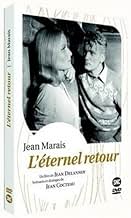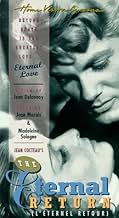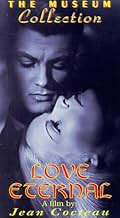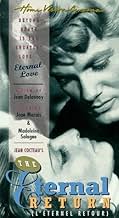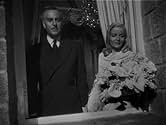IMDb-BEWERTUNG
7,2/10
664
IHRE BEWERTUNG
Füge eine Handlung in deiner Sprache hinzuThis is a retelling of Tristan and Isolde, set in 1940s France. The script was written by Jean Cocteau.This is a retelling of Tristan and Isolde, set in 1940s France. The script was written by Jean Cocteau.This is a retelling of Tristan and Isolde, set in 1940s France. The script was written by Jean Cocteau.
Empfohlene Bewertungen
10QwikBall
I thought this film was genius. For this implicit portrayal of Nazi politics to be made in Vichy France is astounding. The sinister Achille is one of the most shockingly real characters I've ever seen. If you speak French, see this movie (do NOT rely on the subtitling...it's shoddy).
10clanciai
This is perhaps the greatest love story ever brought to us from the darkness of the depths of the Middle Ages, and as the poet he is, Jean Cocteau has made his own poem about it and transferred it to the cinema. The amazing thing about this rendering of the timeless legend as that it is as modern and timeless as his one film "Orphée" seven years later, it could have been made and shot today, its settings can not be identified geographically, its special relationships could occur in any wealthy family, but there is one great difference: the introduction of the absolute evil by the dwarf Achille, who deliberately messes everything up from the beginning, and who delivers the love potion to the not yet awakened lovers on purpose in the belief that it is deadly poison. This is the stroke of genius in this version. Jean Delannoy the director has added to the character of this masterpiece by his own very romantic touch and extremely refined style in fascinating almost thriller-like cinematography all the way. Jean Marais makes one of his finest performances ever, although they are all outstanding, and Madeleine Sologne is over-fascinating in the mystery of her cool detachment changing into a voluntary martyrdom of passionate self-sacrifice. There are few more revolting villains in the history of cinema than this monster of a dwarf, who is entirely the product of a self-indulgent mother who just has spoiled him the more for being a monster. I have seen this film twice before, the first time almost 60 years ago, but its impact of timelessness remains the same and more convincing every time. There has been made a number of remakes of the legend in different settings and newly constructed stories, but this will probably remain the best of all, at least on the screen.
Director Jean Delannoy had intended making the legend of Tristram and Yseult as an historical film but budgetary constraints obliged him to film it in modern dress. Enter poet Jean Cocteau who envisaged this as a vehicle for his 'protegé' Jean Marais.
Taking its title from Nietzsche's 'Thus Spake Zarathustra', Cocteau has imbued his screenplay with what he called 'the marvellous' which he defined as 'that which removes us from the confines within which we have to live.' This of course was manna from heaven for those living under German occupation. Such escapist fare was adored by the public although the critics in their infinite wisdom were less enthusiastic and regarded it as too 'Aryan'. In Britain it was dismissed as 'Teutonic mysticism' and Monsieur Marais described as a cross between Lohengrin and Horst Wessel!
Almost eighty years on however it remains one of the most poetic and beautiful of films. Delannoy is truly blessed to have the services of production designer Georges Wahkévitch, cinematographer Roger Hubert and composer Georges Auric.
Jean Marais' athletic physique and chiselled features make him perfect casting as Patrice and he is complemented by the cool and mysterious Madeleine Solange as Nathalie la blonde. Ironically it was Mlle Solange's perceived chumminess with the Vichy regime that was to damage her career.
Delannoy has drawn splendid performances from Jean Murat, Junie Astor, Yvonne de Bray, Roland Toutain, Jeanne Marken and Alexandre Rignault whilst Périel is unforgettable as the destructive dwarf. The presence of canine chum Moulouk is inspired.
The final apotheosis of the doomed lovers is one of the most memorable scenes on film and cannot fail to move all but the hardest hearted.
Taking its title from Nietzsche's 'Thus Spake Zarathustra', Cocteau has imbued his screenplay with what he called 'the marvellous' which he defined as 'that which removes us from the confines within which we have to live.' This of course was manna from heaven for those living under German occupation. Such escapist fare was adored by the public although the critics in their infinite wisdom were less enthusiastic and regarded it as too 'Aryan'. In Britain it was dismissed as 'Teutonic mysticism' and Monsieur Marais described as a cross between Lohengrin and Horst Wessel!
Almost eighty years on however it remains one of the most poetic and beautiful of films. Delannoy is truly blessed to have the services of production designer Georges Wahkévitch, cinematographer Roger Hubert and composer Georges Auric.
Jean Marais' athletic physique and chiselled features make him perfect casting as Patrice and he is complemented by the cool and mysterious Madeleine Solange as Nathalie la blonde. Ironically it was Mlle Solange's perceived chumminess with the Vichy regime that was to damage her career.
Delannoy has drawn splendid performances from Jean Murat, Junie Astor, Yvonne de Bray, Roland Toutain, Jeanne Marken and Alexandre Rignault whilst Périel is unforgettable as the destructive dwarf. The presence of canine chum Moulouk is inspired.
The final apotheosis of the doomed lovers is one of the most memorable scenes on film and cannot fail to move all but the hardest hearted.
The first Cocteau/Delannoy collaboration.That would not be the only one ("la Princesse de Clèves,1961).
Like "les Visiteurs du Soir" ,"l'Eternel Retour" was the typical Occupation movie : a way to keep reality away .But whereas Carné's work was hailed as an attack against Hitler (Jules Berry's devil was supposed to represent the Fuhrer),Cocteau-Delannoy's fans was sometimes accused of germanophilia.But with hindsight,it's talking nonsense:even if Patrice was a fair-haired Tristan,Jean Marais joined the army and he fought against Nazi Germany.One thing for sure: Jean Marais made his sweater fashionable,and Madeleine Sologne did the same with her hairdo.
This is the "Tristan and Isolde" legend transposed to the contemporary era.Tristan becomes Patrice,Isolde becomes Nathalie (one of the two Nathalie because,like in the story,there are two of them),King Mark simply turns into "Oncle Marc".The dwarf,Frossin,is also featured and is played by Piéral who also appeared in "La Princesse de Clèves" and many historical films.This is really a good directing job by Jean Delannoy,too often slagged off by the Young Turks of the New Wavelet.The castle and the misty banks of the lake are haunting.And Jean Marais is ideally cast as Patrice/Tristan.
If you are interested in the FRench cinema,this is essential viewing.
Like "les Visiteurs du Soir" ,"l'Eternel Retour" was the typical Occupation movie : a way to keep reality away .But whereas Carné's work was hailed as an attack against Hitler (Jules Berry's devil was supposed to represent the Fuhrer),Cocteau-Delannoy's fans was sometimes accused of germanophilia.But with hindsight,it's talking nonsense:even if Patrice was a fair-haired Tristan,Jean Marais joined the army and he fought against Nazi Germany.One thing for sure: Jean Marais made his sweater fashionable,and Madeleine Sologne did the same with her hairdo.
This is the "Tristan and Isolde" legend transposed to the contemporary era.Tristan becomes Patrice,Isolde becomes Nathalie (one of the two Nathalie because,like in the story,there are two of them),King Mark simply turns into "Oncle Marc".The dwarf,Frossin,is also featured and is played by Piéral who also appeared in "La Princesse de Clèves" and many historical films.This is really a good directing job by Jean Delannoy,too often slagged off by the Young Turks of the New Wavelet.The castle and the misty banks of the lake are haunting.And Jean Marais is ideally cast as Patrice/Tristan.
If you are interested in the FRench cinema,this is essential viewing.
This movie was written by Jean Cocteau and it's pretty obvious due to the odd plot twists, romantic tone and mythological roots to the plot. Just a few years later, he was to BOTH write and direct Beauty and the Beast and Orpheus. These two are better films than The Eternal Return, though this movie is still worth watching--particularly as it shows and evolution of Cocteau's ideas. So, this movie is sort of like and unpolished version of these two later movies in many ways--particularly Orpheus. Absent from this film are the odd camera tricks but the story elements are all here.
The love between the two main characters is best described as a combination of the tragic stories of Orpheus and Eurydice along with Romeo and Juliet, but I have recently been informed that the story is ACTUALLY a reworking of the story of Tristan and Isolde. Thrown in for good measure are a malevolent dwarf, the dwarf's detestable parents and a lot of cool plot twists.
However, there were a few things that just didn't work out well in the movie. First, when it was obvious that the crazed dwarf had tried to kill the lovers by offering them what he thought was poison, nothing was done to punish him or place him in an institute for the criminally insane. This is pretty prudent considering what the dwarf does LATER in the story! Second, I hate movies that feature ladies fainting. Unless there is a blow to the head or they've gone without eating for a very extended period of time, people DON'T just faint. This is such a stupid cliché and I'm a little surprised that anyone as innovative and intelligent as Cocteau would resort to this device.
Other than that, it's a nice film.
FYI--An IMPORTANT warning: The video I watched was from The International Collection from Nelson Entertainment. If there are any OTHER companies that make this video, try them first!!!! The captioning was absolutely horrible!! Often, much of the dialog was not subtitled or very long statements were boiled down to one or two words!!! They showed very little respect for the integrity of the movie!
The love between the two main characters is best described as a combination of the tragic stories of Orpheus and Eurydice along with Romeo and Juliet, but I have recently been informed that the story is ACTUALLY a reworking of the story of Tristan and Isolde. Thrown in for good measure are a malevolent dwarf, the dwarf's detestable parents and a lot of cool plot twists.
However, there were a few things that just didn't work out well in the movie. First, when it was obvious that the crazed dwarf had tried to kill the lovers by offering them what he thought was poison, nothing was done to punish him or place him in an institute for the criminally insane. This is pretty prudent considering what the dwarf does LATER in the story! Second, I hate movies that feature ladies fainting. Unless there is a blow to the head or they've gone without eating for a very extended period of time, people DON'T just faint. This is such a stupid cliché and I'm a little surprised that anyone as innovative and intelligent as Cocteau would resort to this device.
Other than that, it's a nice film.
FYI--An IMPORTANT warning: The video I watched was from The International Collection from Nelson Entertainment. If there are any OTHER companies that make this video, try them first!!!! The captioning was absolutely horrible!! Often, much of the dialog was not subtitled or very long statements were boiled down to one or two words!!! They showed very little respect for the integrity of the movie!
Wusstest du schon
- WissenswertesParis box office: 10,511,384 French francs (11-1-1944).
- Alternative VersionenThere is an Italian edition of this film on DVD, distributed by DNA Srl: "LES DAMES DU BOIS DE BOULOGNE (Perfidia, 1945) + L'ÉTERNEL RETOUR (L'immortale leggenda, 1943)" (2 Films on a single DVD), re-edited with the contribution of film historian Riccardo Cusin. This version is also available for streaming on some platforms.
- VerbindungenFeatured in Pink Ulysses (1990)
Top-Auswahl
Melde dich zum Bewerten an und greife auf die Watchlist für personalisierte Empfehlungen zu.
Details
- Laufzeit1 Stunde 47 Minuten
- Farbe
- Seitenverhältnis
- 1.37 : 1
Zu dieser Seite beitragen
Bearbeitung vorschlagen oder fehlenden Inhalt hinzufügen


